Widex Hearing Aids Review 2025
Key Takeaways
- Widex stands out for its technological innovation, including features like AI machine learning and SoundSense Learn technology.
- The brand offers solutions for a wide range of hearing loss types, from mild to profound, to unilateral (one-sided) and asymmetrical (different in each ear) hearing loss.
- Widex is on the higher end of the price spectrum, ranging from $900–$6,500 per pair.
- Widex hearing aids are not available for direct purchase and require consultation with a hearing care professional for purchase, fitting, and adjustments.
The sooner you start protecting your hearing and treating hearing loss the better it is for your overall health and well-being. Untreated hearing loss can lead to social isolation, cognitive decline (including dementia), and a higher risk of falls. [1]Shukla, Aishwarya, et al. Hearing Loss, Loneliness, and Social Isolation: A Systematic Review. American Academy Otolaryngology–Head and Neck Surgery. March 10, 2020. Found on the internet at https://aao-hnsfjournals.onlinelibrary.wiley.com/doi/10.1177/0194599820910377 [2]Reed, Nicholas and Lin, Frank. New Study Links Hearing Loss With Dementia in Older Adults. Johns Hopkins Bloomberg School of Public Health. Jan. 10, 2023. Found on the internet at https://publichealth.jhu.edu/2023/new-study-links-hearing-loss-with-dementia-in-older-adults
One study even concluded the association between going from normal hearing to mild hearing loss was associated with an almost three-fold increase in falls risk. [3]Lin, Frank and Ferrucci, Luigi. Hearing Loss and Falls Among Older Adults in the United States. Archives of Internal Medicine. Feb. 27, 2012. Found on the internet at https://www.ncbi.nlm.nih.gov/pmc/articles/PMC3518403/
Losing your ability to hear can also have a negative impact on your mental health, putting you at greater risk of developing anxiety and depression.
Hearing aids are the most common and effective treatment for hearing loss. Widex is a brand known for its innovative technology and high-quality products, making it a noteworthy choice for those seeking to improve their hearing. In this comprehensive guide, we’ll explore three Widex models, each model’s unique features, and pricing to help you make an informed decision.
- Widex Moment
- Widex Evoke
- Widex CROS
Why you can trust our expert review
We recommend products and services we believe provide value in the lives of our readers. We’ve spent more than 5,000 hours conducting in-depth research on hearing aid devices to give you the most accurate hearing aid review. To make these selections, we:
- Consulted with audiologists and geriatric care experts
- Mystery shopped 18 brands
- Surveyed hundreds of hearing aid users
- Tested various models of hearing aids
- Interviewed experts in the field
- Read thousands of verified customer reviews
Read more about our hearing aid review methodology.
Why Widex is one of our top picks
We chose Widex as one of the best prescription hearing aids for several reasons.
First, Widex hearing aids are designed to treat a wide range of hearing loss. This includes unilateral (one-sided deafness or loss), bilateral (both sides), and asymmetrical (different on each side). We like how fewer sounds are lost on the deaf or hearing-impaired side due to technology that wirelessly transmits sound received by the hearing aid in the deaf or more hearing-impaired ear to the hearing aid placed in the better-hearing ear. Widex also has options for tinnitus ⓘTinnitus is a condition that is often linked to hearing loss and causes constant or periodic ringing or buzzing in the ear treatment, making it our top choice for the best hearing aid for tinnitus.
Second, Widex was one of the first hearing aid manufacturers to integrate both artificial intelligence and real-time machine learning into its hearing aids. What this means for users is that they’ll have access to AI technology designed to automatically map the surrounding sound environment and make automatic adjustments as incoming sounds change, creating a more natural hearing experience.
Third, Widex offers a wide range of types of hearing aids, including behind-the-ear (BTE), receiver-in-canal (RIC), and completely-in-canal (CIC). It also offers a range of colors, so users can match their hearing aids to skin tone or hair color, making the devices less noticeable and more likely to be worn by anyone who may feel anxious about being seen with hearing aids.
Finally, Widex has been in the business of hearing for more than 60 years and continues to improve upon its products. Through a process of testing and research, our Team concluded that Widex has earned its place as one of the best prescription hearing aids available.
Pros and cons of Widex hearing aids
Comparison table of Widex models
| Moment | Evoke | CROS | |
|---|---|---|---|
| *Cost | Around $2,500–$6,500 per pair | Around $2,500–$6,500 per pair | Around $900–$3,000 per device |
| Type/Style | BTE, RIC, and CIC | BTE, RIC, and CIC | BTE, RIC |
| Type of hearing loss | Mild to profound | Mild to profound | One-sided, mild to severe |
| Rechargeable battery? | Yes, two models | No | No |
| Bluetooth streaming? | Yes | Yes | N/A |
| Programs | Three to five, depending on technology level | Three to five, depending on technology level | Three to five, depending on technology level |
| Water resistance | IP68 | IP68 | IP68 |
| Telecoil | Yes | Yes | N/A** |
| Directional microphone | Yes | Yes | Yes |
| Noise reduction | Yes | Yes | Yes |
| Processing channels | 6–15, depending on technology level | 6–15, depending on technology level | N/A** |
**While the CROS device doesn’t have these features, the ear that’s wearing the standard hearing aid may
Widex Moment

- Cost: $2,500–$6,500 per pair (varies by supplier)
- Type/Style: BTE, RIC, and CIC
- Type of hearing loss: Mild to profound
- Rechargeable battery? Yes, one RIC and one BTE model
- Bluetooth streaming? Yes
The Widex Moment hearing aid, released in July 2020, is the brand’s flagship model. It comes in two BTE models, three RIC models, and four CIC models, all of which are available in four different technology levels. The most basic level (and least expensive) is the 110, followed by 220, 330, and 440, the highest level. The 440 offers the best performance but comes at a higher cost. The BTE and RIC models come in 13 color options, and the CIC models come in three skin-tone shades.
The Widex Moment can treat those with mild to profound hearing loss, and it can also effectively treat tinnitus. This is a huge draw for the 25 million American adults who experience tinnitus. [4]Why Are My Ears Ringing? American Tinnitus Association. Found on the internet at https://www.ata.org/about-tinnitus/why-are-my-ears-ringing
Widex hearing aids can only be purchased through a hearing professional, so prices are unavailable online. The final cost, warranty, and return policy will vary depending on the provider you purchase your hearing aids from.
More highlights:
- Artificial intelligence (AI) ⓘArtificial intelligence (AI) is a technology that enables computers and other digital devices to solve problems and learn from experience, tasks that are normally associated with human intelligence.: SoundSense learns which settings you prefer based on your past selections in particular environments
- PureSound experience: This eliminates the lag in sound processing and the “tinny” sound often heard in conventional hearing aids to provide a more natural and clear sound
- Seamless connectivity: Supports direct Bluetooth ⓘBluetooth is a type of technology that uses radio frequency to exchange data without the need for wires. streaming for both iOS and Android users, ensuring high-quality streaming for calls, video streaming, and music, without the need for additional accessories
- Rechargeability: One of the RIC (sRIC RD) and one of the BTE (BTE RD) models are available with rechargeable batteries. A full charge takes approximately four hours and can supply up to 37 hours of use, and a quick charge of 30 minutes can provide four hours of use
- Durable design: Crafted to mitigate moisture damage by integrating advanced water-resistant nano-coating, robust microphones, and smart engineering
- Widex Moment mobile app: Allows users to mute or adjust the volume, change program settings, stream audio, control directional focus, use Zen sound therapy, check battery level and connection status, locate missing hearing aids, and use support features, like troubleshooting, FAQ, and instructional guides and videos
Check out the YouTube video from Widex on how to use the brand’s Moment app.
Widex Evoke
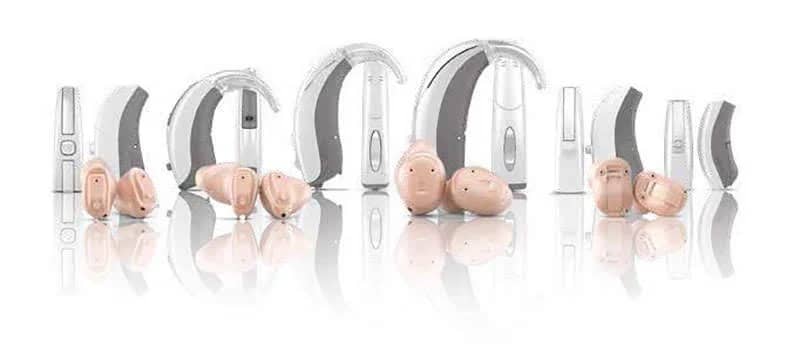
- Cost: $2,500–$6,500 per pair (varies by supplier)
- Type/Style: BTE, RIC, and CIC
- Type of hearing loss: Mild to profound
- Rechargeable battery? No
- Bluetooth streaming? Yes
The Widex Evoke hearing aid is one of the original Widex models and is powered by disposable batteries. It comes in 10 models: four BTEs, two RICs, and four CICs, all in the same four technology level options as the Moment. Two of the BTE and the two RIC models come in 13 color options, the other two BTEs come in 10 color options, and the four CIC models come in the same three color options as the Moment. These models treat mild to profound hearing loss.
The Evoke uses Fluid Sound Analyzer, an AI technology designed to automatically map your environment and make automatic adjustments as the incoming sounds change. It also uses the same SoundSense Learn technology as the Moment, which is designed to get smarter over time as you wear your hearing aids.
Two of the models, the 312 D and BTE 13 D, use the Evoke app, which allows for adjusting or muting the volume, changing directionality, and selecting personalized location-based programs. The Tonelink app is for all other Evoke models. Tonelink uses your phone’s speaker to transmit one-way acoustic commands to the hearing aid. This means you don’t need Bluetooth or any assistive listening devices to use this app.

“The Tonelink app isn’t like hearing aid apps that we’re used to as they don’t allow streaming and aren’t connected to the hearing aids via Bluetooth. They play tones that the hearing aids pick up and make basic adjustments, like volume or program changes only. Typically, these types of apps don’t work that great, but they do offer an option to adjust a hearing aid that isn’t wireless and doesn’t have Bluetooth.”rnrn—Rachel Magann Faivre, AuD, owner of Oklahoma City-based Ash Audiology
Check out the YouTube video from Widex on how to use the brand’s Evoke app.
Evoke offers Bluetooth streaming but does not have the same range of device compatibility as the Moment. Accessories available from Widex help fill that gap, though. The Com-Dex connects your hearing aids with any Bluetooth-compatible device for audio streaming, including your iPhone or Android phone, so you can make hands-free calls, stream music, or watch TV at your own personal volume. The Com-Dex also has a built-in microphone and can be clipped onto a conversational partner’s shirt or placed on the table in front of them for clearer conversations. The Evoke doesn’t have the all-in-one features you’ll find in the Moment, but it’s still a solid choice.
Widex CROS
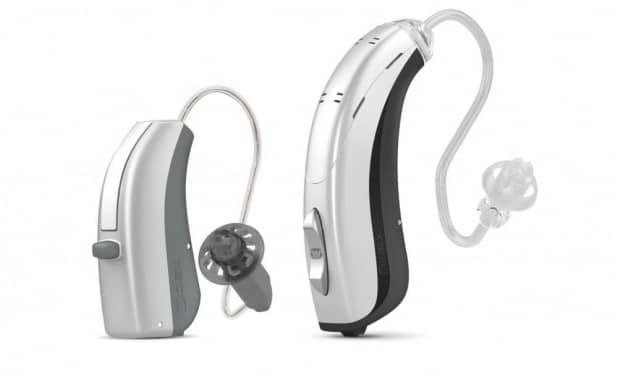
- Cost: $900–$3,000 per device (pricing varies by distributor)
- Type/Style: BTE and RIC
- Type of hearing loss: One-sided, mild to severe
- Rechargeable battery? No
- Bluetooth streaming? No
The Widex CROS hearing aid is specifically designed for people with single-sided deafness (SSD) or one-sided hearing loss, also known as unilateral hearing loss. This model is designed to provide a more balanced and natural hearing experience by wirelessly transmitting sound received by the hearing aid in the deaf less hearing ear to the hearing aid placed in the better hearing ear. Sounds on the deaf side are often lost, making it more difficult to locate the direction of sounds or follow conversations taking place on both sides. If you’re deaf in one ear and have normal hearing in the other, the Widex CROS may be the solution you’re looking for.
The BiCROS solution is similar in scope. BiCROS is designed for those experiencing SSD with loss of hearing on the other side. Like CROS, it relays audio from the device placed on the deaf ear to the device in the hearing-impaired ear to create a more rounded listening experience.
Both CROS and BiCROS can be helpful for group conversations, so even when the speaker is on your deaf side, you’ll still pick up speech without having to turn your head to catch the words with your hearing ear.
Magann Faivre offered additional insight: “CROS devices’ main benefit is hearing sounds from the deaf ear side in quiet situations. Although it does work in noisy situations too, the brain needs input from both sides to filter out background noise and focus on speech. A CROS simply redirects sound from the deaf ear to the opposite ear. Therefore, the brain still only receives sound from one side. So, anyone who has a dead ear will always struggle in noisy environments.”
The CROS comes in two models: Fusion (RIC), and Fashion (BTE). Both models pair with any of the Evoke models and come in 13 color options to match. CROS cannot be used with Moment hearing aids.
Widex CROS uses disposable batteries and the brand boasts battery-saving technology, which uses three times less power than other CROS devices. CROS solutions are also offered by Signia, Starkey, Oticon, and Phonak. Neither Widex nor the other brands offer a rechargeable battery option for CROS hearing aids.
How to adjust Widex hearing aids
Widex offers multiple ways for users to make adjustments to their hearing aids, ensuring a personalized and convenient experience.
- Through your hearing care professional: The most accurate way to make adjustments is through a hearing care professional. During your fitting session, the audiologist will fine-tune the hearing aids based on your hearing test results and personal preferences.
- Through Widex apps: Widex provides various apps (Evoke app, Moment app, and Tonelink app) that allow users to make adjustments directly from their smartphones. These apps offer features, like sound adjustment (volume, mute, treble, and bass) and environment-specific listening programs, such as restaurant and outdoor. You can also use the Widex Remote Care app to schedule and connect with your hearing care professional over video.
- With on-device controls: Physical buttons or dials on the aids can be used to adjust the volume or to switch between different listening programs. These controls are generally easy to use and offer a quick way to make adjustments on the go, without needing to open the app.
- With a remote control: Some Widex models are compatible with a remote control accessory, like the RC-Dex or TV-Dex, providing another convenient option for making personalized volume adjustments without using your smartphone.
- Automatic adjustments: Widex hearing aids are equipped with advanced algorithms that automatically adapt to different listening environments. SoundSense Learn technology uses AI machine learning to continually improve performance based on user feedback and environmental changes.
How Widex works
Widex is one of the largest hearing technology developers and hearing aid manufacturers globally. Founded in 1956 in Denmark by the Tøpholm and Westermann families, the company remains family-owned to this day. Widex hearing aids are sold in more than 100 countries and Widex employs nearly 4,000 people worldwide. The company has a long history of innovation, including introducing the world’s first commercially available 100% digital “in-the-ear” hearing aid in 1995. In 2018, it was one of the first companies to manufacture a hearing aid with both artificial intelligence and real-time machine learning.
If you’re interested in purchasing a Widex hearing aid, you’ll need to go through a hearing care professional for a consultation and fitting.
Accessories
Widex offers a range of accessories designed to complement its hearing aids:
Widex Sound Assist for Widex Moment, Sheer, and Evoke
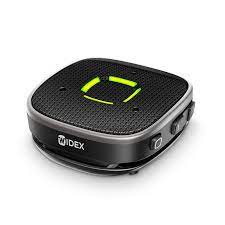
Sound Assist is a five-in-one device designed to improve communication for Widex Moment, Sheer, and Evoke hearing aids. It offers five modes:
- Partner microphone mode
- Table microphone mode
- Streaming mode
- Remote control mode
- Telecoil mode
Widex Com-Dex and Com-Dex Remote Mic
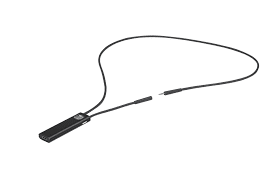

Com-Dex is a hands-free communication device that can connect to two Bluetooth devices or phones. This means if you use two phones, such as a work phone and a personal phone, you can use the Com-Dex to take calls through either one. You can also use one connection for phone conversations and the other for a music device. Com-Dex comes in two models, one that can be clipped to your clothing and the other worn on a lanyard. It’s available in three colors: champagne white, anthracite gray, and emerald green.
The Com-Dex allows you to:
- Stream from any Bluetooth device to your Widex hearing aid
- Better hear people during conversations in noisy settings or from a distance
- Control your hearing aid and microphone discreetly using the Com-Dex App
- Stream from Bluetooth-compatible devices for up to eight hours
You can add the Com-Dex Remote Microphone to your Com-Dex to hear conversations in noisy environments by placing the mic on the table in front of your speaking partner or clipping the mic to your speaking partner’s collar.
Widex RC-Dex

For those who prefer not to use a smartphone app, Widex offers a wireless remote control that allows you to program and adjust the volume of your hearing aids. RC-Dex can also be used to control the TV Play device for Widex Moment hearing aids and is small enough to fit in your pocket or on a keychain.
Widex TV-Dex
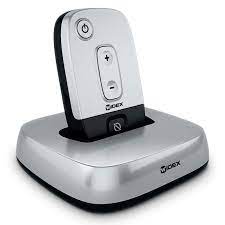
TV-Dex is a wireless assistive listening device that connects directly to your TV to stream audio to your hearing aids. The combination charging base and connector comes with the cables needed to connect it to the TV, and the rechargeable remote control can be worn on a lanyard or held in hand to control the volume or mute the mic on your hearing aids, so only the TV can be heard.
TV Play

Like the TV-Dex, the TV Play also connects directly to your TV to send audio wirelessly to your hearing aids. Instead of a paired remote control, TV Play is controlled through the Widex Moment app. But if you’d prefer to use a remote control instead of the app, you can also control the settings with your RC-Dex remote control.
Charge N Clean
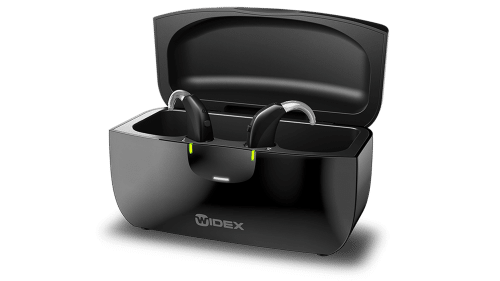
Your Widex rechargeable hearing aids will come with a standard charger, but you can save cleaning and sterilization time with a Charge N Clean charger. It has the same four-hour charge time as a standard charger, but it uses advanced technology to sterilize your hearing aids while they charge.
Using UV-C LED, this compact and portable charger is designed to eliminate nearly 100% of the bacteria, yeast, and viruses that can accumulate on hearing aids. UV-C (ultraviolet C) LED (light-emitting diodes) uses short wavelength light to inactivate or eliminate microorganisms, like bacteria and viruses.
PerfectDry Lux
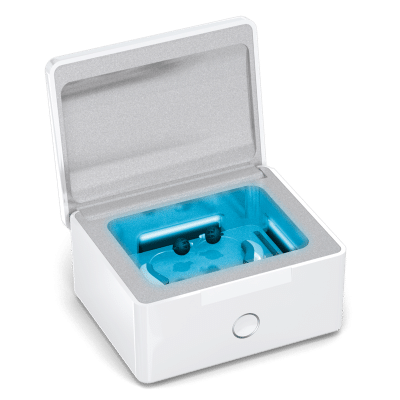
Like the Charge N Clean, the PerfectDry Lux uses UV-C light to sanitize your hearing aids and eliminate almost 100% of microorganisms. It’s also an electronic hearing aid dryer that dries and cleans your hearing aids in just 45 minutes. Although this product isn’t exclusive to Widex, the company recommends daily use for best overall performance from your hearing aids.
Hearing aid batteries
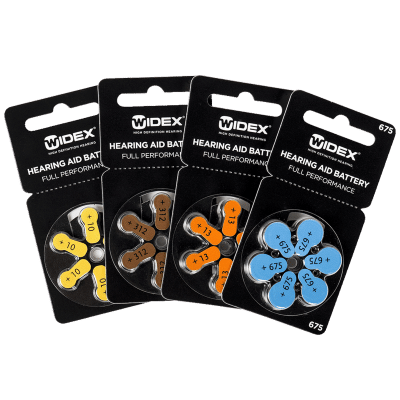
Widex offers its own zinc-air hearing aid batteries for its Evoke, CROS, and other disposable battery hearing aids.
Customer service and support
The Widex website has instructional documents and videos to guide you through setup, operation, and troubleshooting. For most service or support issues, it’s recommended you contact the supplier or hearing care professional you bought your hearing aids from rather than Widex.
Widex does offer several customer service options, though. You can call its Bluetooth connectivity support team at 844-497-8844, Monday through Friday from 9 a.m. to 5 p.m. ET. You can also use the website to submit an online form to request local support services or supplies. A representative from Widex will then contact you with information on how to connect with a local Widex supplier.
Maintenance, warranty, and care
Widex warranty and returns
Widex offers one-, two-, or three-year warranties on its hearing aids, depending on the model and where you purchased it. Additional warranties and return policies will vary based on your hearing aid provider.
It’s important to note that Widex will only honor its warranties and services on products purchased from an authorized Widex dealer. The company explicitly states that online purchases are not covered by its warranty. For most service or support needs, consult your supplier or hearing care professional, who will work directly with Widex on servicing your hearing aids.
Maintenance and cleaning
You’ll find instructional videos for regular cleaning and changing of batteries and filters on the Widex website.
Who Widex hearing aids are for
Widex hearing aids are designed for people who are looking for high quality, technologically advanced solutions for their hearing needs. These are not over-the-counter (OTC) hearing aids, which are generally designed for mild to moderate hearing loss only. Widex offers a more comprehensive range of hearing aid options, including models that can address severe to profound hearing loss.
Widex is well suited for:
- People with severe to profound and one-sided hearing loss
- People with tinnitus
- Tech-savvy users comfortable with advanced technology and apps
- Users who want to hear better in noisy environments
Widex is not well-suited for:
- Budget-conscious consumers
- People with mild to moderate hearing loss for whom an OTC hearing aid might be a more cost-effective solution
- People looking for hearing amplifiers

“We find that some of our most discerning customers, such as audio engineers, gravitate toward Widex Moment hearing aids. Widex is also popular with musicians, thanks to their high maximum input levels, which allows Widex hearing aids to capture a wider array of sounds as compared to other manufacturers.” —Jeff Hall, president of Zip Hearing.
Hall explained to us that one of the factors music professionals are attracted to is the ZeroDelay technology built into Widex hearing aids, which reduces the processing delay between the microphone and receiver, leading to a more natural sound quality.
Comparing Widex to other brands
| Brand | OTC vs Prescription | Cost | Types of Hearing Aids | Types of Hearing Loss |
|---|---|---|---|---|
| Widex | Prescription | $900–$6,500* | BTE, RIC, CIC | Mild to profound |
| Phonak | Prescription | $2,200–$7,000* | BTE, RIC, CIC | Mild to profound |
| Signia | Prescription | $1,500–$6,000* | BTE, RIC, CIC | Mild to profound |
| Eargo | OTC | $1,650–$2,950 | CIC | Mild to moderate |
| Jabra Enhance | OTC | $1,195–$1,995 | RIC | Mild to moderate |
| Audien | OTC | $99–$249 | CIC | Mild to moderate |
| MDHearing | OTC | $299–$699 | BTE, RIC, CIC | Mild to moderate |
For more information, see our comprehensive reviews of the best hearing aids for 2025 and the most affordable hearing aids of 2025.
What to consider before buying hearing aids
Before investing in a hearing aid, it’s crucial to consider several factors to ensure you’re making an informed decision that best suits your needs. Here are some key criteria to keep in mind:
Budget
Hearing aids can range from a few hundred to several thousand dollars. Determine your budget beforehand and consider additional costs, like batteries, maintenance, and potential upgrades.
Type of hearing loss
Different hearing aids are designed to cater to various types of hearing loss, from mild to profound and unilateral (one-sided) to bilateral. Consult an audiologist to understand the severity of your hearing loss and which models are most appropriate for you.
Lifestyle needs
Your daily activities, work environment, and hobbies can all influence the type of hearing aid that will best suit you. For instance, if you’re frequently in noisy environments, you may benefit from hearing aids with advanced noise-cancellation features. If you exercise and want a hearing aid that can handle the sweating, you’ll want a water-resistant design.
Comfort and design
The size, shape, and style of the hearing aid can significantly impact your comfort. Some people prefer discreet, in-the-ear models, while others may find behind-the-ear styles more comfortable.
Battery life
Consider how often you’ll be able to charge your hearing aids or replace batteries. Most rechargeable hearing aids can last an entire day, but the battery life depends greatly on usage. For instance, streaming uses a lot of battery power, so if you’re using your hearing aids to connect to your phone all day, you may need a hearing aid with extra long battery life before needing to recharge, or you may want to go with a hearing aid that uses replaceable batteries, so you can quickly replace your batteries without the downtime (the time without your hearing aids) that comes with recharging.
Connectivity
If you’re tech-savvy, you probably want a hearing aid that can connect to your smartphone and other Bluetooth-enabled devices. This feature allows you to control your hearing aid settings through a connected app and even stream audio from your phone, computer, TV, or radio directly to your hearing aids.
Warranty and customer support
Check the warranty period and what it covers. Also, consider the level of customer support provided, including how easily you can consult with audiologists or customer service for adjustments and troubleshooting.
How to buy Widex hearing aids
Purchasing a Widex hearing aid involves a few essential steps to ensure you’re getting the right device tailored to your specific needs.
Online hearing test
Widex offers a free online hearing test on its website, which can serve as a preliminary assessment of your hearing capabilities. While this test is not a substitute for a professional evaluation, it can provide you with a general idea of your hearing condition.
Consult a hearing professional
Widex hearing aids are not available for direct online purchase or over the counter. You must consult a hearing care professional for a comprehensive hearing evaluation, fitting, and adjustment. This ensures you’ll receive a device that’s customized to your specific hearing needs.
Widex has a Find a Provider feature on its website to help you locate authorized Widex suppliers in your area. Simply enter your ZIP code and the website will list the nearest hearing care professionals that can provide Widex hearing aids.
How much do Widex hearing aids cost?
The total cost for a pair of Widex hearing aids can range from $900–$6,500, depending on your supplier, the model, and additional features you choose. This cost often includes a high level of personal service, such as fittings and adjustments by your hearing care professional. The cost of Widex hearing aids is high, but there are payment options to help.
Financing and payment plans
Your hearing care provider will often partner with financial institutions to offer financing plans that spread the cost of your hearing aids over several months or years. These plans often come with competitive interest rates, making it easier to manage the expense. Some audiologists and hearing care professionals who sell Widex hearing aids offer in-house payment plans. These plans allow you to make monthly payments (with or without interest) until the full cost of the hearing aid is covered.
Insurance coverage
While hearing aids are generally not covered by Medicare, some Medicare Advantage plans and private medical insurance plans do offer partial or full coverage for hearing aids. Check with your insurance provider’s member services to see if Widex hearing aids are covered under your plan.
FSA/HSA eligibility
Widex hearing aids are usually eligible for purchase using funds from a flexible spending account (FSA) or health savings account (HSA). This can offer a pre-tax advantage, effectively reducing the overall cost.
How to save money
Here are some money-saving strategies to consider:
- Veterans benefits: Veterans are often eligible for free or partial coverage on hearing aids through the Department of Veterans Affairs (VA).
- NCOA BenefitsCheckUp: Search for benefit programs in your area that you may be eligible for.
- State vocational rehabilitation programs: These programs can help cover the cost for those who need hearing aids to perform their jobs effectively.
- Nonprofit organizations: Organizations like Lions Clubs International offer assistance programs or discounted devices for those in need.
- Buy older models: Previous hearing aid models can offer considerable savings and still provide excellent sound quality.
- Avoid unnecessary features: Ensure you’re only paying for features you’ll use. For instance, if you don’t need to connect your hearing aids to a smartphone or other Bluetooth devices, you might not want to pay for a hearing aid with Bluetooth capabilities.
Widex hearing aid customer reviews
Widex is not accredited by the Better Business Bureau (BBB). It has 1.5 out of five stars on BBB, but this is based on only two customer reviews. On Trustpilot, Widex has 4.2 out of five stars based on 56 customer reviews and 4.49 out of five stars on Zip Hearing. Customers generally praised the sound quality and performance of their Widex hearing aids, while complaints focused on over-amplified background noise and issues with Bluetooth.
Bottom line
Widex offers a robust range of hearing aids that cater to diverse needs—including those with severe to profound hearing loss, one-sided or asymmetrical loss, and tinnitus—but come at a premium price. If you’re looking for advanced features and customization and are able to invest in high-quality hearing aids, Widex is a solid choice.
The Widex Moment is a highly rated and popular choice. If you are limited by budget, seeking a simple solution, or have only mild hearing loss, you may be able to use a less expensive or over-the-counter (OTC) hearing aid.
Frequently asked questions
Both Phonak and Widex are reputable brands in the hearing aid industry, and each has its own set of advantages. Phonak offers a wide range of models and is known for its Roger wireless technology, which excels in noise reduction, and for its waterproof Phonak Audéo Life. Widex, on the other hand, is renowned for its natural sound quality and AI machine-learning features. The “better” option depends on your specific needs, lifestyle, and type of hearing loss. Your hearing care specialist can help you determine the best brand and model for you.
Widex is considered one of the top brands in the hearing aid industry, particularly for its advanced technology and natural sound quality. The term “best” is subjective and depends on each person’s needs, such as the type of hearing loss they’re experiencing, their budget, and their lifestyle needs.
Yes, Widex hearing aids are highly regarded for sound quality, technological innovation, and a range of customizable options. They treat and are often recommended for various types of hearing loss, from mild to profound, and for unilateral (one-sided) and asymmetrical (different loss on each side) hearing loss.
The cost of Widex hearing aids can range from $900–$6,500 per pair, depending on the model and the additional features built into the hearing aid.
Widex hearing aids are only available through authorized hearing care professionals. You can use the “Find a Provider” feature on the Widex website to locate a supplier near you.
Widex offers a wide range of types of hearing aids, including behind-the-ear (BTE), receiver-in-canal (RIC), and completely-in-canal (CIC).
The primary difference lies in the number of features and customization options. The Moment 440 offers more advanced features, like additional sound programs and channels, making it more adaptable to various listening environments compared to the Moment 330. Because the Moment 440 is the highest technological level, it is also the most expensive.
Only two Widex models are rechargeable: the Moment BTE RD and the Moment sRIC RD.
Widex hearing aids are not waterproof but are designed to be water-resistant. It’s advisable to remove them during activities, like swimming, bathing, or showering. If your hearing aids get wet from sweat or rain, you’ll need to take your hearing aids out of your ears and dry them thoroughly to remove excess moisture before using them again.
The lifespan of a Widex hearing aid can vary, but it’s generally around five to seven years, depending on usage and maintenance.
Widex rechargeable batteries can last up to 37 hours on a single charge, depending on usage and streaming activities. Bluetooth streaming uses a good deal of battery power. It’s important to note that rechargeable batteries will lose their life over time. Typically, a battery’s charge will start declining after five years.
Widex hearing aids are manufactured in Denmark and are distributed globally through authorized providers.
Make sure your hearing aids are fully charged before pairing them with your phone.
On your iPhone:
- Go to Settings and enable Bluetooth.
- Go to Settings, scroll down to Accessibility and tap for more options, and then scroll to Hearing Devices and tap to see the settings.
- If you have rechargeable hearing aids, place them in the docking station and then take them out again. For battery-operated hearing aids, open and close the battery doors to restart them.
Your iPhone should now be able to discover your Bluetooth-enabled hearing aids and will show the name of your hearing aids on the phone screen.
Once your iPhone finds the hearing aids:
- Tap on the hearing aid name to begin pairing.
- If you’re wearing two hearing aids, you’ll see each one on the screen, left (L) and right (R), and will be given the option to pair each hearing aid individually.
Your hearing aids are now connected, so you can stream phone calls and other audio from your phone.
The iPhone hearing aid menu will show the hearing aids are connected and a menu for making volume and other sound adjustments. For more sophisticated and customized adjustments, use the Moment, Evoke, or Tonelink apps.
To prevent hearing notification alerts and system sounds from your phone, turn “Play System Sounds” off. You can still have phone call notifications turned on even with the system sounds turned off, if you wish. You can also decide individually which notifications you want to hear and which ones you don’t.
- Go to Settings, scroll down to Accessibility and tap for more options, and then scroll to Hearing Devices and tap to see the settings.
- Turn off the Play System Sounds option. The slider button will be gray when off and green when on.
Have questions about this review? Email us at reviewsteam@ncoa.org.
Sources
- Shukla, Aishwarya, et al. Hearing Loss, Loneliness, and Social Isolation: A Systematic Review. American Academy Otolaryngology–Head and Neck Surgery. March 10, 2020. Found on the internet at https://aao-hnsfjournals.onlinelibrary.wiley.com/doi/10.1177/0194599820910377
- Reed, Nicholas and Lin, Frank. New Study Links Hearing Loss With Dementia in Older Adults. Johns Hopkins Bloomberg School of Public Health. Jan. 10, 2023. Found on the internet at https://publichealth.jhu.edu/2023/new-study-links-hearing-loss-with-dementia-in-older-adults
- Lin, Frank and Ferrucci, Luigi. Hearing Loss and Falls Among Older Adults in the United States. Archives of Internal Medicine. Feb. 27, 2012. Found on the internet at https://www.ncbi.nlm.nih.gov/pmc/articles/PMC3518403
- American Tinnitus Association. Why Are My Ears Ringing? Found on the internet at https://www.ata.org/about-tinnitus/why-are-my-ears-ringing
